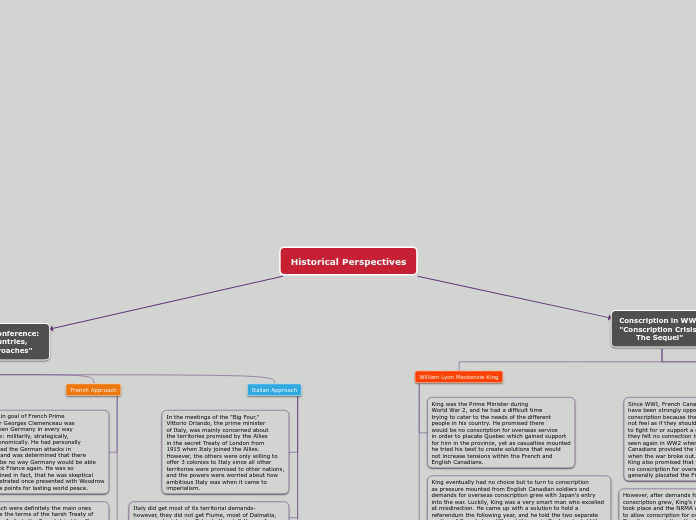Historical Perspectives
Paris Peace Conference:
"Different countries,
different approaches"
American Approach
Woodrow Wilson, the US President
who attended the conference, was
not just focused on having a specific
country to blame for the war-
instead, he was interested in
creating lasting world peace.
He took many progressive ideas
and translated them into foreign
policy, including free trade, open
agreements, democracy, and
self-determination.
One of Wilson's major aims was
also to create a League of Nations
which would maintain peace between
regions without the need for any
conflicts.
The United States wanted to establish
more diplomacy in the world, and did not
respect the harsh terms that the European
countries imposed on Germany within the
Treaty of Versailles.
British Approach
Britain had a few specific
goals in mind for the
conference. These goals
include: ensuring the safety
of France, removing Germany
as a threat, settling territorial
disputes, and supporting the
League of Nations.
Britain's approach to what was
priority in the Paris Peace Conference
seemed to be in the middle ground
between the French and US. David
Lloyd George, the Prime Minister of
Britain who attended, even coined
Woodrow Wilson of the US and Georges
Clemenceau of France as Jesus Christ
and Napolean respectively, referring
to how idealistic Wilson's views were in
comparison to Clemenceau who was
mainly interested in punishing Germany.
French Approach
The main goal of French Prime
Minister Georges Clemenceau was
to weaken Germany in every way
possible: militarily, strategically,
and economically. He had personally
witnessed the German attacks in
France and was determined that there
should be no way Germany would be able
to attack France again. He was so
determined in fact, that he was skeptical
and frustrated once presented with Woodrow
Wilson's points for lasting world peace.
The French were definitely the main ones
to outline the terms of the harsh Treaty of
Versailles. In fact, the French tried to offer
the Germans the peace treaty on their own
yet the Germans rejected it as they believed
the United States would reduce the severity
of the terms rather than France (Lloyd George
ended up pushing for more favorable terms.)
Italian Approach
In the meetings of the "Big Four,"
Vittorio Orlando, the prime minister
of Italy, was mainly concerned about
the territories promised by the Allies
in the secret Treaty of London from
1915 when Italy joined the Allies.
However, the others were only willing to
offer 3 colonies to Italy since all other
territories were promised to other nations,
and the powers were worried about how
ambitious Italy was when it came to
imperialism.
Italy did get most of its territorial demands-
however, they did not get Fiume, most of Dalmatia,
nor any colonial gain. Orlando then left the conference
in rage.
When Orlando went back to Italy,
there was a general disappointment
in the country. The nationalist and fascist
parties used this disappointment to
propose the idea that Italy was betrayed by
the Allies and were refused what they deserved.
This idea led to the rise of Italian fascism.
Conscription in WW2:
"Conscription Crisis
The Sequel"
William Lyon Mackenzie King
King was the Prime Minister during
World War 2, and he had a difficult time
trying to cater to the needs of the different
people in his country. He promised there
would be no conscription for overseas service
in order to placate Quebec which gained support
for him in the province, yet as casualties mounted
he tried his best to create solutions that would
not increase tensions within the French and
English Canadians.
King eventually had no choice but to turn to conscription
as pressure mounted from English Canadian soldiers and
demands for overseas conscription grew with Japan's entry
into the war. Luckily, King was a very smart man who excelled
at misdirection. He came up with a solution to hold a referendum the following year, and he told the two separate parties of Canada two different things: in Quebec, he told the citizens it would not be about conscription but rather the possibility of it, and in English Canada where conscription was supported he assured that it would be a vote for mandatory enlistment. His referendum eventually took place and he declared his position of "not necessarily conscription but conscription if necessary,"- he did this so well that when conscription began to be necessary he did not receive backlash from the usually turbulent French Canadians. This crisis showed how King led Canada through WW2 in a calm and collected way.
French Canadians
Since WWI, French Canadians
have been strongly opposed to
conscription because they do
not feel as if they should be forced
to fight for or support a country that
they felt no connection to. This was
seen again in WW2 when English
Canadians provided the bulk of soldiers
when the war broke out. Prime Minister
King also promised that there would be
no conscription for overseas service, which
generally placated the French Canadians.
However, after demands for overseas
conscription grew, King's referendum
took place and the NRMA was now amended
to allow conscription for overseas service.
Despite some rioting, the French-Canadians
during WW2 actually accepted this decision.
It was clear to them that King had resisted
as long as possible, and they went on to
support King and reelect him.
English Canadians
English Canadians provided the bulk
of the soldier volunteers during WW2,
and felt that they weren't being
supported enough by others. Many
supported conscription, especially the
soldiers who were already fighting and
requested support from home.
The majority of English Canadians voted
"yes" in King's referendum, which allowed
for conscription in overseas service.
